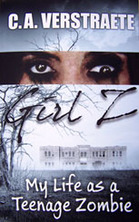 It is real! The "eagle-eyed" will see a teensy slight change. It looks really cool, don't ya think? See GIRL Z: My Life as a Teenage Zombie page for details.
0 Comments
The 7 Deadly Sins of Writing
Sin is a word that may be out of fashion in much of society, but looking at the darker places inside ourselves can be beneficial if we are willing to do something about them. Lest you think this is a sermon, the concept of the Seven Deadly Sins can be applied to your writing, as well. 1. Sloth Clean up sloppy writing. Eliminate unneeded modifiers and words. Cut the number of adverbs, words ending in ly, which are usually unnecessary. For instance, tighten the description to show a character's anger instead of writing it as he said, angrily. 2. Gluttony Use the right word. Write tight. Don't fill up space with two words if one will do. Don't use $10 words because you can. Write at a level that anyone can enjoy without running to the dictionary. If they can't understand it, they won't read it. 3. Greed Don't cut corners in your work. Wanting more is good, but it shouldn't be all consuming. 4. Envy Sometimes the little green-eyed monster can awaken when you see the success of other writers and authors. Wish them well and work hard. Maybe your turn is next. 5. Lust The eyes are the windows to the soul. What you take in can affect who you are and what you write. A good question might be, is this something I'd show my mother, pastor or want God to read? 6. Pride You should be proud of accomplishments, but there's some truth in the Biblical adage that "pride comes before the fall." Many of those CEO's now spending time behind bars still feel the world owes them a living and just don't get it. A little pride is good; a lot is dangerous and can turn you into the person no one wants to be around. 7 Anger/Wrath Leave the anger to your characters. Let them simmer and stew on the page. Save your health. ** Your Turn: Have a few sins that you feel writers should never commit? Share them or feel free to confess your own if you dare. Thought I'd repost some of my older writing tips...
(* See another older tip on some things writers can do at The Teen Word Factory) The question: Is your writing flat - or fluffy? The little bear on that Snuggle fabric softener commercial has the right idea - fluffy is better. How do you get fluffy writing, you ask? Simple. 1. Describe. Give the reader a mental image, but don't overdo it. It's easy to just write and fill in the blanks, watching your word count pile up, only to end up with serviceable, good sentences that are kind of blah. They're flat on the page. 2. Fluff up your writing by reading authors you like, and even a few you don't like. Watch other authors' word usage. Remember: a car isn't just a car in fiction - it's a gleaming red hot rod or a burgundy-striped clunker. Flat: car. Fluffy: color and type. I started thinking about fluffy writing as I'm reading one of Elaine Viets' latest in the Dead End Jobs series, CLUBBED TO DEATH. No criticism meant; I love her books. (Elaine, I mean fluffy as a compliment. Her book was the one at hand at the moment. Any examples of hers are in quotes.) I'm enjoying the story, but when I read I always take note of the writing, too, in this case, the descriptions. Example: hair isn't just hair: it's "long, chestnut hair." 3. Another example: give a mental image of the person - Flat: He strolled. Fluffy: "...had a bulldog walk..." When you're writing, it's sometimes easy to forget this and rely on those tired old favorites. (Mine is walked, and sometimes nodded.) 4. Use a fine-tooth comb. As a few other writers have mentioned, it's a good idea to go back and do a search in Word for your favorite over-used phrase or word. See how many times you used it, then think up a few fluffy new examples. Your writing will only be the better for it. |

Blog by Chris Verstraete - author, award-winning journalist, miniaturist. I love dogs, too. It's all good.
Archives
May 2024
Categories
All
|
 RSS Feed
RSS Feed